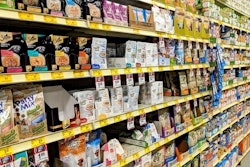
In early August 2020, Smalls, a direct-to-consumer (DTC) pet food company focused on cats, announced it had received a round of investment funding – another sign that investors see potential and momentum in not only customized pet food products but also in the DTC model. That model was becoming a force before this year, and the pandemic has only spurred it on.
“During the past few years, several startups have received multimillion-dollar investments including the Farmer’s Dog, JustFoodForDogs, Ollie, Pet Plate and NomNomNow,” wrote Packaged Facts analysts in their recent report, “Pet Food in the U.S., 15th Edition.”
As in so many other areas, pet food is closely aligned with human food on this – actually, when it comes to DTC, pet food may actually be leading its human cousin. A couple of months ago, I wrote about Pepsico starting two DTC websites in May. While its efforts lagged those of other large multinationals like Nestle and Unilever, it seems small pet food companies like those named above have been earlier to market and are experiencing impressive growth. Smalls, for example, tripled its sales from 2018 to 2019, while Cali Raw Nutrition, another startup that was growing 25-35% month-over-month before the pandemic, saw 50% growth from March to April 2020 and another 40% from April to May.
Now, as many countries including the U.S. continue to struggle with controlling COVID-19 outbreaks, other parts of the human food supply are trying DTC – from large meat producers to small farmers and ranchers.
Selling meat directly to consumers
Even before the pandemic hit, back in January 2020, Perdue Farms, the fourth largest poultry integrator in the U.S., launched its own DTC channel. “As both online shopping and the demand for convenience show no signs of slowing down, we felt it was important to be in this space,” said David Zucker, Perdue Farms senior vice president of e-commerce and new ventures, at the time.
Little could Perdue know what was to come. The coronavirus pandemic significantly disrupted the meat supply chain in the U.S., along with other types of food. News coverage of COVID-19 rampaging through meat and poultry processing plants, dairies dumping large quantities of milk and farmers plowing under their crops awoke everyone, including consumers, to the complexity and, in some cases, fragility of the food supply chain.
That, along with the unabated move to e-commerce, seems to be inspiring other producers to jump on the DTC bandwagon. In June, Wayne Farms, another large poultry company, started expanding its chicken product sales through the Savory Butcher, an online broker that allows consumers to purchase meat at wholesale prices.
Shortly after, my colleague Austin Alonzo, editor of Watt Poultry USA, reported on his conversation with Will Sawyer, lead economist on animal protein for CoBank’s Knowledge Exchange Division. Sawyer said DTC could be a win-win for the consumer and the poultry industry. “The customer will pay a lower price, and integrators can move more product,” Alonzo wrote.
Other e-commerce platforms connect consumers with even smaller ranchers and farmers. For example, Crowd Cow (what an inspired name!) facilitates DTC sales for small ranchers.
On the non-meat side, consumer supported agriculture (CSA) farms have been an option for several years for consumers wanting to buy produce, eggs and similar foods, often grown organically, from local farmers. With the pandemic-driven disruption of the supply chain, startups emerged or pivoted to help farmers who normally sell into the supply chain instead go DTC. For example, Full Harvest, which initially found buyers for imperfect produce, started hearing from desperate farmers in March who couldn’t move their crops – so Full Harvest is now helping connect them with consumers instead.
DTC enables transparency, trust for consumers
Another of my colleagues, Deven King, managing editor of Egg Industry and part of a beef ranching family in Iowa, conducted an informal poll of her Facebook friends and followers about their experiences shopping in grocery stores and the availability of meat products there. This was in late May.
While King acknowledged this was an unscientific survey with a small sample (48 responses), it still provided interesting results, including this: Several respondents said they have investigated or wanted to find out how to reach a meat producer directly.
“One individual from Michigan specifically said she would love to buy directly from a farmer so she knew exactly what was in her food,” King wrote. “Several respondents are producers of meat, like me. They have had more orders or requests from consumers to buy whole animals than ever before.” (She also noted that, unfortunately, getting an appointment to process an animal in order to sell it was a significant challenge.)
King said that for her, one takeaway from the responses she received was that transparency will always be important to consumers, and this unique situation presented an opportunity for meat to producers to teach consumers “why we do what we do.”
I see another close parallel to pet food here, especially with the companies offering customization and DTC sales: That direct connection to their consumers, while providing constant, immediate market feedback and even data for research for the companies, also helps their consumers feel they’re buying from a source they can come to know and trust. These days, that’s more important than ever.
View our continuing coverage of the coronavirus/COVID-19 pandemic.


















